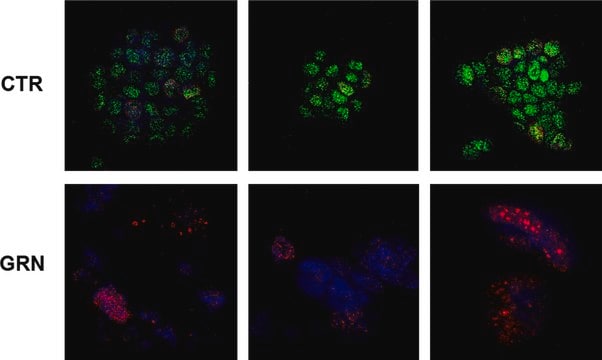ABS44
Anti-MAPK 1/2 Antibody
from rabbit
Synonym(s):
ERK-1, ERT2, Extracellular signal-regulated kinase 1, Insulin-stimulated MAP2 kinase, MAP kinase 3, MAP kinase isoform p44, MAPK 3, Microtubule-associated protein 2 kinase, Mitogen-activated protein kinase 3, MNK1, p44-ERK1, p44-MAPK, ERK-2, ERT1, Extrac
About This Item
Recommended Products
biological source
rabbit
Quality Level
antibody form
purified antibody
antibody product type
primary antibodies
clone
polyclonal
species reactivity
human, mouse, rat
species reactivity (predicted by homology)
canine (based on 94% sequence homology), bovine (based on 94% sequence homology)
technique(s)
immunocytochemistry: suitable
immunoprecipitation (IP): suitable
western blot: suitable
NCBI accession no.
UniProt accession no.
shipped in
wet ice
target post-translational modification
unmodified
Gene Information
human ... MAPK1(5594)
General description
Specificity
Immunogen
Application
Signaling
MAP Kinases
Western Blotting (SNAP ID) Analysis: 1-2 µg/mL from a representative lot detected MAPK 3/MAPK 1 (ERK1/ERK2) in BALB/3T3, A431, and L6 cell lysates.
Immunocytochemistry Analysis: A 1:500 dilution from a representative lot detected MAPK 3/MAPK 1 (ERK1/ERK2) in NIH/3T3, A431, HeLa, and C2C12 cells.
Quality
Western Blotting Analysis: 0.5 µg/mL of this antibody detected MAPK 3/MAPK 1 (ERK1/ERK2) in 10 µg of A431 cell lysate.
Target description
Linkage
Physical form
Storage and Stability
Analysis Note
A431 cell lysate
Other Notes
Disclaimer
Not finding the right product?
Try our Product Selector Tool.
recommended
Storage Class Code
12 - Non Combustible Liquids
WGK
WGK 1
Flash Point(F)
Not applicable
Flash Point(C)
Not applicable
Certificates of Analysis (COA)
Search for Certificates of Analysis (COA) by entering the products Lot/Batch Number. Lot and Batch Numbers can be found on a product’s label following the words ‘Lot’ or ‘Batch’.
Already Own This Product?
Find documentation for the products that you have recently purchased in the Document Library.
Our team of scientists has experience in all areas of research including Life Science, Material Science, Chemical Synthesis, Chromatography, Analytical and many others.
Contact Technical Service








